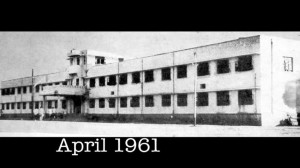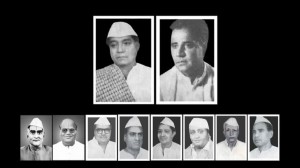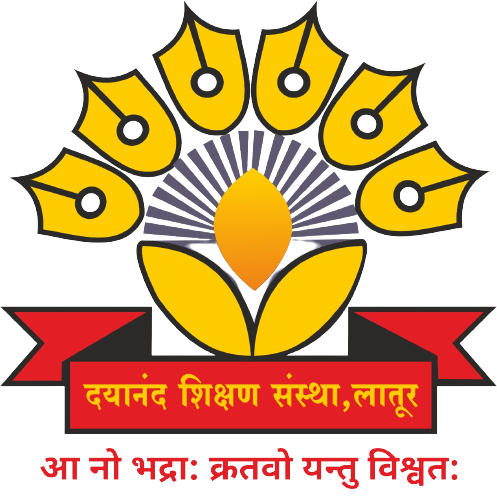History
Dayanand Education Society, Latur was established in May 1961. Latur, then, was a Taluka place in Osmanabad District. Aspiring students from poor and middle class families could not get any facility for higher education, except for going to Mumbai, Pune or Hyderabad. For a candidate from economically backward family leaving Latur for pursuing higher education was rather dream like. So to make the flow of education reach to the grass root level, to the sons and daughters of farmers and workers community, renowned personalities and business persons like Late. Manikraoji Sonavane, Late. Raja Narayanlalji Lahoti, Late. Chandrashekherdada Bajpai, Late. Madanlalji Biyani, Shri. Shantibhai Shah, Late. Nathmalji Innani, Late. Ranaba Mandade, Late. Ramgopalji Rathi, Late. Tamanappa Utage, Late. Keshavraoji Sonavane instituted Dayanand Education Society in May 1961. In June 1961, under the aegis of Dayanand Education Society Arts, Commerce and Science colleges started functioning. The foundation stone was laid at the auspicious hands of the then Governor of Maharashtra Hon. Shriprakash.


The Society accepted “ aa no bhadra kratavo yantu vishwatha” (let knowledge from all corners of the Universe come to us) the 14th Mantra from 25th chapter of Yajurveda as its Mission Statement. What was a small plant in yesterdays; today it has grown in to a huge tree. Late. Manikraoji Sonavane was the first President and Late. Chandrashekhardada Bajpai was the Secretary. Today Hon. Laxmiramanji Lahoti presides over the Society and Hon. Rameshji Biyani is the Secretary.
“Latur Pattern” in academic field has come into existence by the persistent efforts put in by all the colleges of this Education Society. In June 1961 Arts, Commerce and Science Colleges were together which afterwards were made independent for academic and administrative reasons. Dayanand Science was given independent recognition in 1967 so were Arts and Commerce in 1970. In the same year i.e. 1971 Dayanand Law College was established. In 2009 Dayanand College of Pharmacy was established. Dayanand Education Society, Latur owns 22 acre and 20 gunthas of land. Each college has a separate Principal, Office and administrative system. Each college has a huge independent building on the campus of Dayanand Education Society. The total strength of all five colleges in 2012 goes up to 9720 students pursuing their U.G. and P.G. degree in diverse streams. Research facilities are also available in all the colleges.
Dayanand Education Society, Latur celebrated Golden Jubilee in 2013. The Golden Jubilee Celebrations concluded on 01 June 2013 in the auspicious presence of Hon. President of India Shri. Pranab Mukherjee.
Dayanand Education Society, Latur came into being out of the dire necessity of students and parents who could not afford to send their wards to Pune or Aurangabad for higher education. The philanthropists like Late Raja Narayanlal Lahoti, Late Manikrao Sonwane, Late Madanlalji Biyani Late Chandrashekhardada Bajpai and likeminded people came together and decided to establish Higher Education Institute in Latur that would facilitate people in Latur and Marathwada region. Sumptuous amount could be collected from farmers who donated Rs. 01/- each after selling their produce in the market. Initially, all the three faculties –Arts, Commerce and Science were together but in 1970 Arts and Commerce colleges were given independent status. What was a humble beginning has turned out to be a huge tree. Presently 08 different Institutes run under the aegis of Dayanand Education Society, Latur.
About College
Dayanand College of Arts, Latur right from its inception has been striving to offer quality education to economically backward rural students. We are proud to have vast alumni base working in different sections and divisions in Government and Non-government sectors. Most of the teaching fraternity in the vicinity and the region are our alumni. At present the college offers 07 Post Graduate Programmes and 06 Under Graduate Programmes and Recognised Research Centers in English, Hindi and Marathi recognised by the affiliating university. We are the only single faculty Arts College that offers variety of Programmes. Innovative Programmes like Animation and Web Design, Fashion Dress Design and Administrative Services which were limited to Metropolitan cities, we offer the education in the same.
We work for the achievement of :
- Imparting quality education to socially and economically weaker sections.
- Aiming to bring about educational and cultural changes in rural students.
- Providing necessary amenities like hostel, gym, grounds and canteen
- Achieving social transformation through education.
- Promoting intellectual, ethical and cultural development of students.
- Increasing employability
Vision and Mission
Vision
विद्याधनं सर्वधनं प्रधानम्
The Power of Knowledge is the most Superior Power of all.
Mission Statement
Transferring Knowledge into Wisdom
To attain the vision statement of the institute, the administration sets aims and objectives, innovative practices, job opportunities and national integration to make the students competent with values manners and varied skills. Keeping in mind the recommendations made by the Peer Team during the second cycle accreditation, the college has set out activities and generated funds from the governmental and non-governmental sources. The students are made socially aware and liable through the programmes such as N.S.S., N.C.C., Workshops, Seminars and Conferences, and sports and games. The students of rural area are given opportunities to develop leadership through cultural, political, economic and social events.
Goals and Objectives
- To impart quality education in Humanities
- To encourage students’ participation in peer teaching
- To increase students’ involvement in community engagement
- To inculcate values of nationalism
- To create knowledge-oriented society
- To optimise students’ participation in
- To cater to the needs of students community in general and weaker section in particular
